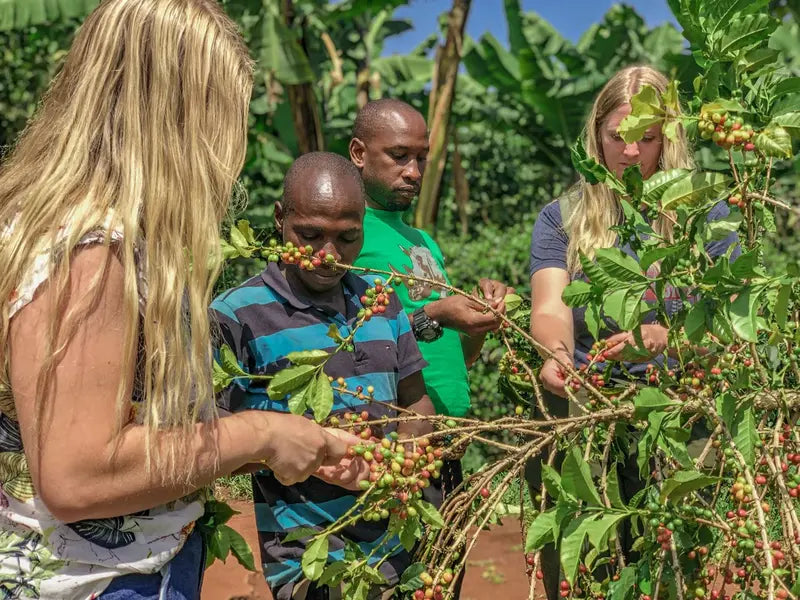


This coffee’s roasted in our espresso style — but that doesn’t mean you need to brew it as espresso. You can make it however you like — espresso, filter, moka pot, AeroPress or whatever you enjoy. We roast it a touch darker than we would a filter roast to caramelise the sugars and bring out smooth chocolatey and nutty flavours that cut beautifully through milk.
When you add milk the natural sweetness, fat and proteins tend to soften acidity and highlight caramelised flavours. That’s why lighter filter roasts can sometimes taste a bit sharp or sour with milk — they’re simply not built for it. Espresso roasts being more developed balance this out. The deeper caramelisation creates toffee and cocoa notes that blend harmoniously with milk’s creaminess while a hint of gentle bitterness adds that satisfying ‘coffee punch’ in your flat white or cappuccino.
If you prefer your coffee black this roast will still give you a full-bodied rich cup with plenty of depth and sweetness. For a lighter fruitier experience you might enjoy exploring our filter range instead.
Origin and Sourcing
?
?
?
Roast Details
?
?
?
?
Taste Profile
?
?
Uganda | Sipi Falls | SL14/SL28 Anaerobic Natural (Organic) - When is peak freshness?
Medium Roast - Roasted on Roest P3000
Uganda | Sipi Falls | Anaerobic Natural is a specialty coffee offering that originates from the Sipi Falls region, located on the slopes of Mount Elgon in eastern Uganda. This area is renowned for its breathtaking landscapes, fertile volcanic soils, and ideal climate for cultivating high-quality Arabica coffee. The cool temperatures and abundant rainfall, combined with elevations ranging from 1,600 to 1,900 meters above sea level, create perfect growing conditions for specialty coffee with unique flavor profiles.
Organically certified, this coffee has been grown and harvested as part of the Sipi Falls Coffee Project. The project was first initiated in 1999 and has grown to incorporate more than 5,000 smallholder producers who tend an area over 2000 hectares in size. Approximately 3.5 million families are linked both directly and indirectly to coffee through the Sipi Falls Project. Through training and extension services offered through the project, producers are encouraged to improve agronomic practices in order to increase yield and improve quality. Producers practice intercropping with food crops and shade trees to improve coffee quality and foster income diversification. Field officers mentor members on the effects of climate change, good agri practices, internal control systems, water recycling, community education and organic standards.
The coffee is grown on the slopes of Elgon mountain range in three distinct areas, namely the Mbale, Sironko, and Kapchorwa Districts, and is thus found at varying altitudes, ranging from 1300 metres in the South, climbing up to 1900 metres in the Central and Northern Districts. For this nation of farmers the cultivation of coffee has always been a major preoccupation and one of the few sources of commercial income available to rural families. Coffee growing has always remained the exclusive preserve of the smallholder, and the leading sector of the Uganda economy.
The Anaerobic Natural process used for this coffee involves a controlled fermentation stage where the coffee cherries are fermented in oxygen-deprived environments before being dried in their fruit. This innovative method enhances the coffee's complexity, producing vibrant flavors and distinctive characteristics. Coffee processed in this way often features pronounced fruity notes, with a rich sweetness and unique undertones, such as tropical fruits, wine-like acidity, and a creamy body. The natural sweetness from the fruit further enriches the cup, making it a favorite among specialty coffee enthusiasts.
The Sipi Falls region also holds cultural and economic importance for the local communities. Many smallholder farmers in the area rely on coffee as a primary source of income, and projects aimed at promoting anaerobic processing have empowered these farmers to access premium markets. Sustainable practices, community-based initiatives, and a focus on quality have not only elevated the reputation of Sipi Falls coffee but also supported the livelihoods of local producers. This coffee represents a harmonious blend of exceptional flavor, innovative processing, and community impact.
Coffee in Uganda
Uganda is a prominent player in the global coffee industry, recognized as one of the leading coffee producers in Africa. The country’s unique geographical and climatic conditions make it ideal for cultivating both Arabica and Robusta coffee. Arabica is typically grown in the high-altitude regions, such as Mount Elgon in the east and the Rwenzori Mountains in the west, while Robusta thrives in the warmer, lower-altitude areas around Lake Victoria. Coffee cultivation in Uganda is deeply ingrained in the culture, providing livelihoods to millions of smallholder farmers who rely on this crop as their primary source of income.
The quality of Ugandan coffee has gained international recognition, with distinct flavors reflecting the diverse growing regions. Arabica coffee from Uganda often exhibits fruity and floral notes, with a crisp acidity that appeals to specialty coffee enthusiasts. Robusta, on the other hand, is known for its strong, full-bodied profile and is a staple in many espresso blends worldwide. Efforts to improve post-harvest processing techniques, such as better fermentation and drying practices, have further enhanced the reputation of Ugandan coffee on the global market.
In addition to its economic significance, coffee plays a central role in Uganda’s social and cultural fabric. Traditional coffee ceremonies are an important part of community gatherings, symbolizing hospitality and unity. However, the industry faces challenges, including climate change, fluctuating global prices, and a need for better infrastructure. Despite these hurdles, initiatives led by the government and non-governmental organizations aim to equip farmers with training and resources to improve yield and quality. These efforts ensure that Ugandan coffee continues to thrive, bringing prosperity to local communities and delighting coffee lovers worldwide.
SKU: sipifalls_1000g
Package Weight: 1100g
How does my coffee come packaged?
- Choosing a selection results in a full page refresh.
- Opens in a new window.



